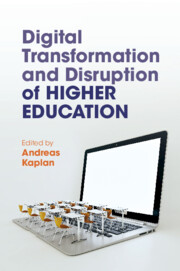Book contents
- Digital Transformation and Disruption of Higher Education
- Digital Transformation and Disruption of Higher Education
- Copyright page
- Contents
- Figures
- Tables
- Contributors
- Preface
- Chapter 1 Nothing Is Constant Except Change
- Part I (R)evolution of the Higher Education Sector
- Part II Changes in Teaching Formats
- Part III Changes in Teaching Content
- Part IV Networking and Social Activities
- Part V Certification and Diplomas
- Chapter 19 Shared Learning in Higher Education
- Chapter 20 Degrees of Disruption
- Chapter 21 Born-Digital Universities
- Chapter 22 Personalisation of Higher Education
- Part VI Careers and Professionalisation
- Part VII Futuristic and Ultramodern Higher Education
- Part VIII Higher Education in Motion
- Editor’s Biography
- Index
- References
Chapter 20 - Degrees of Disruption
Alternative Educational Credentialing
from Part V - Certification and Diplomas
Published online by Cambridge University Press: 09 June 2022
- Digital Transformation and Disruption of Higher Education
- Digital Transformation and Disruption of Higher Education
- Copyright page
- Contents
- Figures
- Tables
- Contributors
- Preface
- Chapter 1 Nothing Is Constant Except Change
- Part I (R)evolution of the Higher Education Sector
- Part II Changes in Teaching Formats
- Part III Changes in Teaching Content
- Part IV Networking and Social Activities
- Part V Certification and Diplomas
- Chapter 19 Shared Learning in Higher Education
- Chapter 20 Degrees of Disruption
- Chapter 21 Born-Digital Universities
- Chapter 22 Personalisation of Higher Education
- Part VI Careers and Professionalisation
- Part VII Futuristic and Ultramodern Higher Education
- Part VIII Higher Education in Motion
- Editor’s Biography
- Index
- References
Summary
While career and technical schools have offered short-term credential programs for decades, a proliferation of digital badges, bootcamps, and other micro-credentials have recently emerged. A 2021 Credential Engine report identified nearly 550,000 short-term credentials offered by “non-academic” organizations in the United States. How individual states envision their regulatory role in this space remains understudied. Our study focuses on insights gleaned from semi-structured interviews with leaders from 14 organizations, including state authorization agencies, public higher education system offices, and private educational providers. We highlight shared challenges in the authorization process, including budget and resources; institutional responsiveness and knowledge of the process; self-reported data; and infrastructure limitations. We then discuss four emerging themes in the short-term credential landscape, including the need for clear credential quality criteria; balancing state regulation with providers’ autonomy; the tension between viewing short-term credentials as businesses or colleges; and the disruption and opportunities COVID-19 presents to the industry.
Keywords
Information
- Type
- Chapter
- Information
- Digital Transformation and Disruption of Higher Education , pp. 255 - 268Publisher: Cambridge University PressPrint publication year: 2022
References
Accessibility standard: Unknown
- 1
- Cited by
